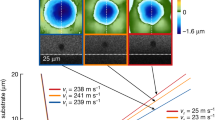Abstract
IT appeared to be so definitely one of the fundamental assumptions of physics that pure mercury has a constant density under given physical conditions that when Brönsted and Hevesy announced that they had separated it into fractions of different density (see NATURE, September 30, 1920, p. 144) it appeared desirable that the separation should be confirmed by other observers. One of us finds that when mercury (purified chemically and by distillation in a vacuum) is distilled in a very high vacuum the first sixth of the original mercury condensed is of lower density than the last sixth. The difference in density found for these fractions was 44 parts in 1,000,000. This difference does not appear to be due to error in the density determinations for the mass found in different experiments, for a constant volume of the same specimen of mercury is constant to one part in a million, and with special care it is constant to a few parts in ten millions.
This is a preview of subscription content, access via your institution
Access options
Subscribe to this journal
Receive 51 print issues and online access
$199.00 per year
only $3.90 per issue
Buy this article
- Purchase on Springer Link
- Instant access to full article PDF
Prices may be subject to local taxes which are calculated during checkout
Similar content being viewed by others
Author information
Authors and Affiliations
Rights and permissions
About this article
Cite this article
LABY, T., MEPHAM, W. The Isotopes of Mercury. Nature 109, 206–207 (1922). https://doi.org/10.1038/109206b0
Issue Date:
DOI: https://doi.org/10.1038/109206b0
Comments
By submitting a comment you agree to abide by our Terms and Community Guidelines. If you find something abusive or that does not comply with our terms or guidelines please flag it as inappropriate.



